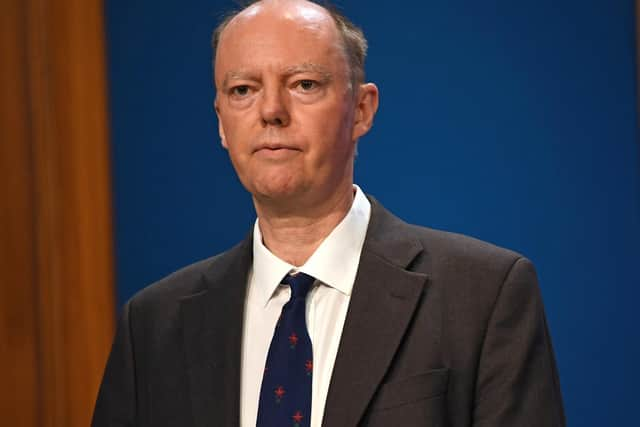England's chief medical officer Chris Whitty calls for national strategy to tackle ill health in coastal areas


In his annual report Mr Whitty said the Covid-19 pandemic underlined “the concentration of pre-existing health conditions and chronic disease in certain geographies”.
The report highlights that despite efforts to address problems, coastal communities and port cities have some of the worst health outcomes in England, with low life expectancy and high rates of many major diseases.
Advertisement
Hide AdAdvertisement
Hide AdBlackpool, has the worst life expectancy in the UK, while Hull’s director of public health Julia Weldon described residents having “far shorter lives... spent in far poorer health”, with poor health beginning prematurely, largely the result of preventable diseases.


One in five pregnant women in the city smoke - twice the England average - while the the estimated prevalence of opiate drugs and crack cocaine is also double the England rate.
North East Lincolnshire’s director of public health stated that people in their most deprived communities are “old before their time”.
The difficulty of attracting NHS and social care workers to coastal areas is also highlighted, with the report finding there were 15 per cent fewer consultants and 7.4 per cent fewer nurses per patient than the national average despite higher healthcare needs.
Advertisement
Hide AdAdvertisement
Hide AdMr Whitty said coastal areas had often been overlooked by governments and their ill-health hidden because their outcomes are merged with wealthier inland areas.
More precise data was needed, as well as action from Health Education England and NHS England and Improvement to tackle health and social care staff shortages, with a national strategy “informed by local leaders and experts”.
He said: “If we do not tackle the health problems of coastal communities vigorously and systematically there will be a long tail of preventable ill health which will get worse as current populations age.”
Scarborough MP Robert Goodwill said generally North Yorkshire was a healthy place, but there were pockets in the seaside town which probably had more in common with parts of Hull and Northallerton.
Advertisement
Hide AdAdvertisement
Hide AdGPs needed to play more of a role and “not be frightened of pulling a few punches” when telling patients what the outcomes of their lifestyles might be.
People knew if they were overweight they would be more likely to die of Covid-19, he said, adding: “If that doesn’t concentrate people’s minds on diet and lifestyles, I’m not sure what the Government can do to give a stronger message.
“We all know the solution is to eat less, exercise more, stop smoking, not drink too much. I don’t think we need a huge report to tell us that. It is down to simple choices you make every day.”
Hull’s director of public health Julia Weldon said it was “time to recognise and address the unjust and unnecessary burden of multiple health inequalities” and there needed to be “targeted and sustained focus on Building Back Fairer”.
Advertisement
Hide AdAdvertisement
Hide AdBut councillor Mike Ross, leader of the opposition Liberal Democrats on Hull Council said while agreeing with the findings, the report didn’t seem to say anything new.
He said: “You have to question why such a strategy doesn’t already exist - what people need to see is real action on the ground, not simply paper on a shelf.
“Whatever does come forward from this needs to have the support of the public, otherwiser they will just ignore it and it will end up fizzling out.”
Health Secretary Sajid Javid said the report raised "important points on inequalities" and he would consider the recommendations carefully, adding: “Those living in coastal areas clearly face different sets of challenges to those inland but everybody, no matter where they live, should have similar opportunities in education, housing, employment and health.